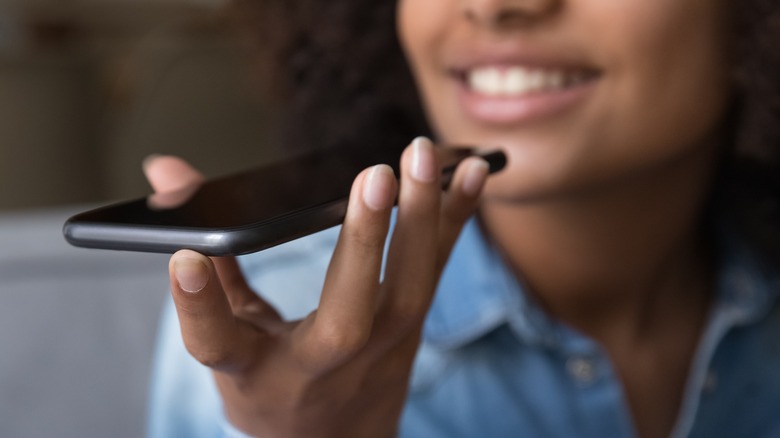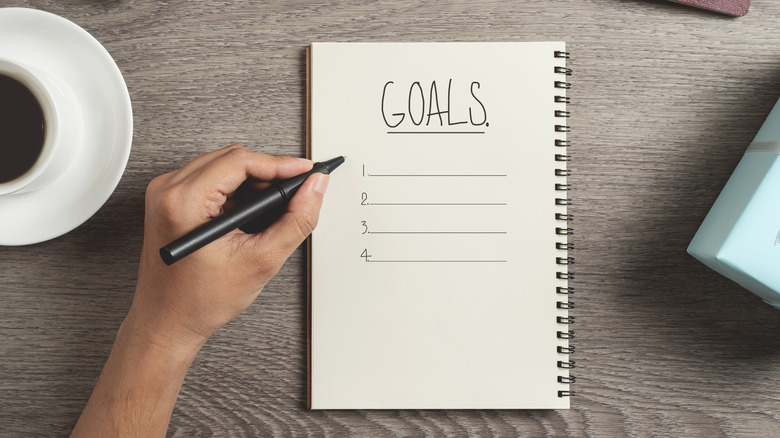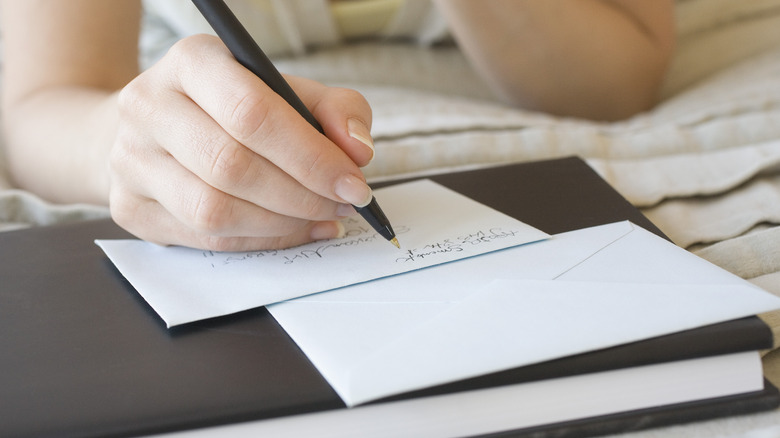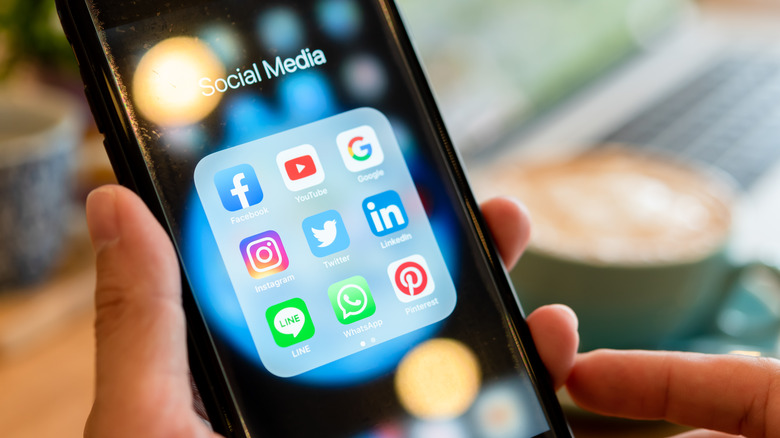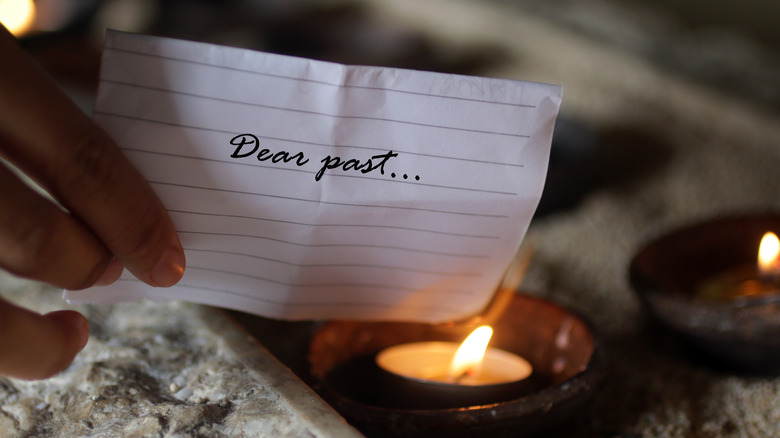12 Alternatives To Traditional Journaling That Still Boast Plenty Of Mental Health Benefits
It's no secret that traditional journaling has some major mental health benefits. From giving us a space to articulate our thoughts to teaching us how to be more mindful, putting pen to paper has been proven to have a positive impact on our lives. As psychologist Dr. Carla Manly explained to Today, "Journaling also improves mental health and allows for stress relief, because it can provide a safe space to unload your pent-up thoughts and feelings."
But while journaling has a plethora of benefits, it's not for everyone. Not all of us have time in our daily lives to pick up a pen and paper, nor are we all super confident in our writing skills. So what do you do if you're just not that into opening a notebook to jot down your innermost thoughts, but still want the wellness benefits? If that sounds like you, then we have plenty of alternatives to traditional forms of journaling that will still give you mental health benefits while allowing you to be more creative.
Talk your way to better mental health
Audio journaling may be for you if you're an advocate of speaking your feelings — and it's exactly what it sounds like. It involves journaling using a smartphone, recording device, or a specific audio journal app to say your thoughts and feelings out loud, rather than putting pen to paper. Think of it like leaving a voice note for a friend, but you can be the only person who ever hears it — if you so choose.
There are a number of benefits audio journaling has over traditional journaling. It can be particularly beneficial for those who prefer to talk about things with friends or a therapist, potentially serving as an extension of a traditional therapy session. This method can also be much quicker than writing things down, as noted by public health specialist Elizabeth Lucy to Journify, because it doesn't require a pen and paper. Many people also just find it easier to speak their thoughts rather than write comprehensible sentences.
Audio journaling may also serve as a great introduction to more traditional journaling, as it's often used as a gateway tool to get people more comfortable about expressing their thoughts without having to employ any writing skills. Even better? It allows the person journaling to be able to hear their exact tone and mood in a way that can't always be conveyed by the written word. Win-win, right?
Get in front of the camera
If you're not camera-shy, video journaling can be a great way to improve your mental health without having to be confined to traditional methods of journaling. Video journaling is a little bit like what we see our favorite YouTubers do when they're vlogging or sharing their video diaries with the world — but that doesn't mean you ever have to show your video to anyone else. Not only will you get all the benefits of audio journaling by adding the video element, but many may also find it helpful to physically see themselves as they speak, including being witness to facial expressions we rarely get to see in ourselves, which may be telling while speaking about specific thoughts or feelings.
Video journaling is recommended by a number of professionals because of the big impact it could have on those struggling with their mental health. The University of Rochester Medical Center endorses journaling (whether it be on paper or through a camera phone) as a method of helping ease feelings of anxiety, depression, and stress. It can also allow participants to gain a better understanding of their emotions in a way that's pretty fun and different.
Get creative
Writing down your feelings may not be for you, but that doesn't mean you can't still use a piece of paper to express yourself in a way that feels comfortable. Instead of traditional journaling, you could try grabbing a notebook and doodling in it, using stickers, or even creating a personalized mood board with photos or images from magazines that resonate with you. There really are no limits to what might work for you outside of using traditional words!
"A journaling process is like a fingerprint, every one is unique and there's no right way to do it," author Kia Marie Hunt explained to Canon, speaking about why journaling doesn't have to just be pages and pages of writing. The best part? You don't even have to stick to one method. "The best way to find your favorite kind of journaling is to experiment. Try all kinds of things and don't limit yourself — no one needs to fit into just one journaling 'box'," Hunt shared. "Variety is fun."
Creative journaling can have a number of benefits over traditional methods, as many people may find it more enjoyable than a long writing session, while it may also make it easier to select pre-existing images to represent how you're feeling rather than relying on your own descriptive skills. Let's face it, the written word just isn't for everyone, but this well could be.
Go for perspective
If you don't feel your strength lies in the written word, picking up a camera (or your phone) could be a better way for you to express yourself and gain perspective — in more than one way. Photo journaling involves taking a photo (usually every day) that represents your mood. You could even take it one step further and snap multiple photos in a day that tell a story of what you went through or how you felt. After that, what you do with the images is completely up to you. You could put all the photos together in a traditional journal, post them online, put them on a noticeboard, or just leave them on the device. One of the best parts, though, is that there's no pressure to write anything down.
"People get scared at the thought of writing words on the blank page. It can feel a bit like being at school, where you have to get the grammar right and maybe you think your handwriting isn't good enough," Susannah Conway, who runs the online course Journal Your Life, explained to Psychologies. "Taking a photo with your camera phone can feel easier and more accessible than writing."
Photo journaling has quite a few proven benefits when it comes to mental health. A 2018 study found that taking a photo daily and posting it online helped some participants experiencing grief and loneliness, while also acting as a form of socializing.
Turn to technology
If you find your eyes more glued to the screen than paper these days, then turning to technology may be more suited to you than traditional pen-and-paper journaling. There are tons of different apps and websites out there designed to make the process easier and even more fun, with many simplifying journaling by offering things like prompts and tasks, to help you to get the most out of your out-of-the-box self-reflection session — which can be particularly helpful if you're new to the world of journaling and have no idea where to start.
One of the most popular modern journal apps is Day One, which has a number of features designed to make it easier to get your feelings out. It includes several templates, so you're not starting from scratch (because we all know how daunting a blank page can be), as well as offering prompts to help you decide what to write about on any given day.
A blog can also be a valid journal alternative too. You're getting everything out in the same way you would by manually writing in a notebook, but tapping on a keyboard could feel a little more natural — particularly if you're not confident in your handwriting. You may even benefit from publishing the blog (anonymously or otherwise) rather than keeping it private. Knowing other people can read what you're going thorough, and maybe even giving them the opportunity to respond, could offer some comfort.
Track your mood
If you're looking for something simple and super quick, an app like Daylio could be for you. Daylio is actually a mood tracker that allows you to keep a record of how you're feeling as regularly as you like, while also offering a bullet journal function (which is a quick, often single-sentence form of journaling) to help you better identify triggers that affect your mood. Unlike traditional journaling, it can be done in literally any situation in mere seconds. Plus, you have instant access to all your past thoughts and feelings without having to carry a notebook around, which can help you get a better self-perspective. But you don't necessarily have to use technology to keep track of your moods. You could do a basic version of the same thing in a standard notes app or on a traditional notepad.
"Oftentimes, when we are experiencing emotional discomfort, we may not immediately know what has contributed to it nor the specific emotions that we are experiencing," psychologist and relationship coach Sheva Assar explained to HelloGiggles. "By taking a moment to check in, we're able to gain a better understanding about our internal experiences, factors that contributed to the emotional discomfort, and specifically, identify and label the emotions that we are experiencing."
Quickly list your goals
If you're tired of, or just don't fancy, pouring out your feelings in paragraph after paragraph with traditional journaling techniques (whether that's on your phone, laptop, tablet, or notebook), you may want to try something as simple as just noting your goals as often as is useful for you. Rather than reflecting too much on the past, quickly writing down what you want to do in the future can help you stay focused on what's coming rather than what's gone, and fits into a busy schedule better than more traditional methods of journaling. It's also a method you can do anywhere, at any time, on any platform that lets you see exactly how you're doing.
"Building a daily habit to review and write your goals down is a powerful tool to keep yourself accountable," psychotherapist Kristin Papa explained to Bustle.
Write a letter
Journaling is often encouraged as a daily practice, but that may not work for everyone. With our increasingly busy schedules, fitting in time to sit down and write down our thoughts every single day may just be too much of an ask. If the concept of writing excites you, but you just don't have the time, you may benefit from letter writing instead of committing yourself to regular journaling sessions,
There can be all different types of letters that feel therapeutic to write. From a letter full of gratitude you want to give to a loved one, to a letter explaining how you really feel about someone who wronged you, letter writing can be ideal for getting all your feelings out on paper without journaling. Plus, you can do whatever you want with the letter after you've written it. You could hold onto it forever or even, if you think it would be therapeutic, give it to the person you wrote it for.
Marriage and family therapist Elizabeth Sullivan explained to Psych Central that writing to someone you have unfinished business with can create a better understanding of how you really feel about that person and your thoughts on the situation as a whole.
Email yourself
Like writing a letter, writing emails can help you to make sense of your feelings from day to day. But instead of the message being intended for someone else, this one would be for you. Writing emails to yourself is a bit like positive journaling (the practice of writing down positive words to boost your mood) but with a twist. Sending yourself regular emails detailing all the things you love about yourself and the great things you did that day can be an instant confidence boost. The big benefits of doing it in email form, rather than writing in a notebook, include being able to write and access the messages anywhere, anytime. It also gives you the opportunity to schedule a positive email to yourself when you know you might need it the most. You can keep the messages as long or as short as you like, and use terms that maybe only you understand.
"Research shows that regular positive journaling can boost optimism, increase positive emotions and enhance our physical and mental well-being," psychology practitioner Sophie Cliff told Happiful.
Make use of social media
Though social media has a bad rep for having a detrimental effect on our mental health, it can actually be a helpful alternative to journaling – if you change the way you use it.
Social media like Instagram, Facebook, and Snapchat can be used to create an online journal. You could write lengthy or short sentences and/or paragraphs with or without photo accompaniments, or simply share photos demonstrating how you feel. The big benefits include having all your entries available at the click of a button, and plenty of different forms of media to express yourself. You may want to create an account without your name attached to it to keep things private (refraining from adding friends or followers may also help), but social media sites can be a solid alternative to traditional journaling.
Pinterest is another great way of expressing yourself without having to put too much work or time into things. The app, which is like an online notice board, has millions upon millions of images that may represent how you're feeling, allowing you to create online boards based on everything from your moods, to your hopes and dreams, to positive messages and affirmations. Ultimately, you should try to keep things positive on social media. As psychotherapist Miyume McKinley told VerywellMind, "Everyone has different triggers and experiences that will affect how technology will impact them. However, platforms that prompt mental and emotional health are helping to break the cycle of negativity."
Burn it
One of the problems many people have with journaling is that they don't always want their old, sometimes negative, thoughts lingering around. While journals can be a great way to self-reflect, they can also serve as a stark reminder of dark places (or people) we maybe don't want to give a permanent place in our lives. That's where fire comes in. Instead of writing everything down in a book that you then hold on to, it may be better for your mental health to write down whatever you feel you need to release (whether it be long paragraphs or short, sharp, sentences) on a single piece of paper before then burning it.
Writer and personal development and spiritual growth coach David James Di Pardo told Best Self that the very notion of letting those thoughts and feelings burn up with the flames can be more freeing than storing up old emotions in a notebook. It may also really help if you feel you have something you want to move on from and not be reminded of. "The unknown of what comes next, once we no longer have our stories to cling to, can be frightening. But if you were compelled to write it down, then deep down you're ready to release it," he said.
Create a listening journal
If music is your thing, the listening journal could be the method you've been waiting for. There's no hard and fast rule on how best to do this, but there are plenty of ways music could work its way into your journaling life. Why not make a playlist of songs that make you feel a certain way and then listen to them while doing some self-reflecting? Or, if you're a musician yourself, create video or audio Journals that only feature your music. If you feel comfortable, you could even explain a little bit about the song, where the inspiration comes from, and how it makes you feel. You could also do this with existing songs that strike a chord.
There have been numerous studies over the years about the effect music can have on mental health, with various findings that listening to songs can help to ease some negative feelings, including depression and anxiety. The National Alliance on Mental Health found that music can be used to process emotions related to some of the most difficult things we go through, like trauma and grief, which makes it the ideal alternative to traditional journaling.

